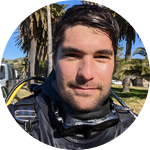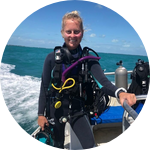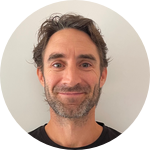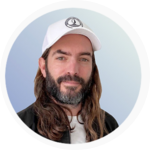About This Project
The Florida Keys are essential nursery habitat for commercial and recreational fish species. Despite this vital ecologic and economic position, studies reveal significant plastic contamination, highlighting a critical knowledge gap in ultra-small (<0.3mm) concentrations, which pose significant risk to ecosystem health[1]. We will fill this gap with first-of-a-kind collection of 0.3-0.05mm plastic using our unique trawl system, initiating long-term mitigation and monitoring projects.
Ask the Scientists
Join The DiscussionWhat is the context of this research?
When people think about plastic in the ocean they imagine floating garbage, from large meter-scale pieces, down to small particles the size of sand. They do not consider the potentially more detrimental invisible micro-plastics (0.1-0.05mm) that can easily be ingested by marine life and eventually find their way into our food; and us[2]. As we investigate these invisible micro-plastics more, there is a disturbingly increasing trend in the amount we find, coupled with a lack of knowledge about what the environmental and human health impacts will be[3]. It has become imperative to identify the amount of micro-plastics in the ocean, in marine life, analyze its impacts, and begin monitoring and mitigating any effects.
What is the significance of this project?
Every year, approximately 400 million tons of plastic waste are produced, much of which ends up as micro- and nano-plastic particles[4]. When ingested by marine organisms, these particles can cause a host of health issues[6,7]. In the Florida Keys, a vital ecologic and economic habitat, recent studies have revealed significant micro-plastic contamination in fish species and sea cucumbers[5]. Additionally, micro-plastics less than 300 µm, specifically around and below 50 µm, can be absorbed by human cells and transported throughout the body[6]. Data on the environmental and human health impact of microplastics in these ranges in seafood is almost nonexistent. We need to act now, studying the issue, establishing its effects, and proposing effective mitigation. This project is an important piece in the web of required information to make informed policy.
What are the goals of the project?
The project goal is to establish 0.3-0.05mm micro-plastic concentrations in the Florida Keys, we will be sailing various near-shore and off-shore transects while dragging a custom net system called a manta trawl. This device will allow us to collect floating micro-plastics in the 0.3mm-0.05mm range, which can then be analyzed to determine type and concentration. We will additionally collect marine life samples (e.g. plankton and mussels) to look for ingested micro-plastics. Not only will the sampling serve to start a long-term, micro-plastic concentration monitoring project, but it will also serve as an impetus to bring local stakeholders together through a planned workshop where preliminary data can be presented and discussed.
Budget
This expedition is a 1-week, shipboard, sampling cruise of the Florida Keys marine habitat. The sampling goal is to collect free-floating microplastics from the water and to collect marine specimens that may be contaminated with similar micro-plastics (e.g. local mussels). The total estimated project budget for the expedition is $12,412, which includes the cost of hiring a research vessel, a professional sailing and research crew, running an outreach workshop to engage local stakeholders, and the post-cruise sample processing and data publication. Of the total, we have already raised $7,770 through the Sea Keepers Society in conjunction with the National Marine Sanctuary Foundation, leaving a balance of $4,642. This project data will fit into a framework of our similar studies ongoing across the Mediterranean, the North Atlantic, and the Coral Sea, as well as contributing to the NOAA database on floating plastic pollution.
Endorsed by
 Project Timeline
Project Timeline
March, 2025 - Ship-board sample collection and workshop (Florida Keys)
April-June, 2025 - lab-based sample analysis and processing (micro-plastic size and type distribution/concentration)
July-October, 2025 - data write up and submission for publication
Dec 12, 2024
Project Launched
Feb 01, 2025
Organize and plan stakeholder micro-plastic workshop
Mar 14, 2025
All participants travel to Florida Keys
Mar 15, 2025
Ship-board sampling (1-week)
Mar 22, 2025
Stakeholder micro-plastic workshop (1-day)
Meet the Team
Team Bio
We are a highly-interdisciplinary team of published professional researchers, sailors, and ocean conservationists, with backgrounds in oceanography, marine and molecular biology, nano-science, polymer physics, and toxicology. Together, we have decades of experience planning and implementing these research expeditions in locations across the globe. This expedition will be run by Dr. Preston Sutton, Dr. Roman Lehner, with support from SeeKeepers and National Marine Sanctuary Foundation.
Preston Sutton, PhD
Preston is a polymer physicist, a sailor and an outdoor guide. His research career focused on materials science related to Li-ion batteries, mostly through utilizing nano-scale, polymer properties to engineer electrolytes and functional layer forming materials. After completing a PhD and postdoc at the Adolphe Merkle Institute in Fribourg, Switzerland, winning the SNSF Mobility Grant to continue postdoctoral work in Australia, and eventually managing research projects in industry. He has recently transitioned away from lab work in favor of field work and ocean conservation on sail boats. His focus is on inspiring thoughtful and effective research to preserve the world’s oceans and natural beauty.
Roman Lehner, PhD
Roman is the co-founder and scientific project leader of the sail & explore association. He did research on the topic of micro- and nanoplastics and their possible impacts on human health at the Adolphe Merkle Institute in Fribourg, Switzerland. He designed a worldwide first human 3D in vitro intestinal model to assess the possible adverse effects of ingested microplastics such as inflammatory responses. Furthermore, he is performing the world’s first study on the effects on human immune cells when exposed to environmentally relevant microplastics. In addition, he is researching the production of nanoplastic particles that can be used as first marker particles allowing the investigation of possible adverse effects and cellular interactions. In addition, he is leading scientific sailing expeditions on the topic of microplastics for Sail & Explore.
Project Backers
- 3Backers
- 4%Funded
- $155Total Donations
- $51.67Average Donation



